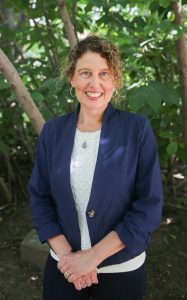Even when students returned in person to campus this past year, the student experience was still not quite the same. Travel to conferences was suspended, for example, and many events were still virtual. University of Missouri’s (MU) College of Agriculture and Natural Resources (CAFNR) Rebecca Mott, assistant teaching professor in the Division of Applied Social Sciences, collaborated with Amy Leman, assistant research professor from University of Illinois’ (U of I) Agricultural Leadership, Education and Communication program to try to still make their students’ classroom experiences as engaging, interactive, and applicable to real life as possible.
“Dr. Leman and I were introduced virtually in the spring of 2020 and immediately hit it off. As we talked more, we realized that we taught a similar course at our home institutions,” said Mott.
Together, under the mentorship of Jon Simonsen, associate professor in Agricultural Education and Leadership at MU, Leman and Mott applied for and received an Innovative Teaching Award from the Association of Public and Land-grant Universities’ (APLU) Board on Agriculture Assembly’s Academic Programs Section.
“This award encouraged us to expand our own teaching and learning as we created this project together to enhance our students’ learning,” said Mott.

The focus on enhancing student learning became even more critical during the spring of 2020.
“As soon as it became clear that COVID was going to change the 2020-2021 academic year, we began adapting our plans for the upcoming school year,” Mott said. “We wanted to provide our students with as many opportunities and connections as we possibly could considering the circumstances. We knew our students still wouldn’t have the opportunity to network or interact with each other or with industry leaders at conferences or events like they normally would because of COVID.”
Mott and Leman developed an innovative approach to program development, bringing students together in virtual teams to build a program for an outside stakeholder. This provided students the opportunity to make new connections with students at a different university and work with industry professionals outside of their institutions.
Once students met their program development team members, each worked with an outside stakeholder group to create a training/educational program for their organization. Stakeholders from three states provided seven different project opportunities. These stakeholders were identified by Mott and Leman before the course began. Examples of project topics included agricultural education, food safety and sanitation, customer service, and presentation skills.
Teams were made up of 6-7 students with a mix from both universities. Teams were responsible for communicating with their stakeholder by setting up virtual meetings. Next, teams were asked to interview representatives of the target audience to gain a better understanding of the human experience central to the program. Over the course of the semester, students met with their home university during regular class hours. The students enrolled in the program development at MU and U of I, along with their professors, also met every other week virtually to touch base and address challenges that program development teams faced.
“Students loved having a project that was applicable and hands on,” said Mott. “Giving students the opportunity to work with stakeholders directly helped them understand people’s perspectives on a deeper level.
“Students also tend to appreciate having a completed project to add to their portfolio of work. Many list these programs they have developed on their resumes and bring components of their programs to show employment as they interview for jobs.”
Several of the organizations that university students worked with are preparing to implement components of the program students created.
“Missouri’s Ag Ed on the Move Program is going to run with some components of the mentorship program our students created this fall,” Mott said. “The Council for Agricultural Science and Technology is an organization housed in Ames, Iowa, that focuses on enhancing communication among various agricultural sectors, educators, and the public who are interested in agricultural issues. CAST is preparing to use the students’ virtual lesson plan template as a model as they expand outreach to high school teachers and students.”

Mott and Leman have plans to continue this collaboration. They both have ideas to elevate the experience even more. “While students still made connections with each other virtually, we found that the collaboration and connection between students wasn’t as strong as we hoped. It took time for members of teams to become comfortable with one another and communicate effectively. We think that if students could meet with their group members in person at least once, it could make a real difference.”
For 2022, Mott and Leman are tentatively planning a launch weekend for students and stakeholders. Stakeholders will have the opportunity to pitch their project idea to the students in person. After hearing the stakeholders’ pitches, students would be able to choose which project group they would offer the most value to.
“This launch weekend will provide the opportunity for students from both universities to connect in person before working with each other virtually,” Mott said. “It will also allow them to connect with their stakeholder that has requested the program to gain a better understanding of ideas and expectations.”
Mott and Leman hope that it will kick-start students’ motivation and help to solidify ideas early in the semester.
“We are excited to provide this launch weekend where students will be able to connect with each other and meet stakeholders in person. Hopefully this is the missing piece to the project that we need,” Mott said.
Mott teaches several undergraduate and graduate courses in the Agricultural Leadership, Communication and Education department in CAFNR. Her course topics include youth leadership development, qualitative research methods and program development and evaluation.